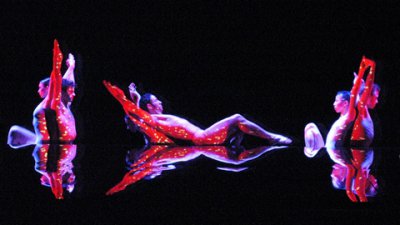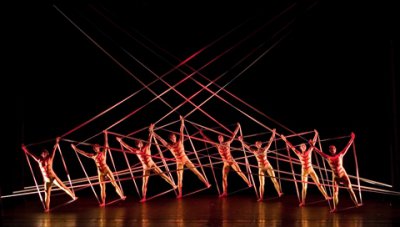Alwin Nikolais Celebration
A reminder of the genius of a great American modern dance pioneer.
[avatar user=”Joel Benjamin” size=”96″ align=”left” ] Joel Benjamin, Critic[/avatar]It is difficult for audiences, dancers and choreographers today to appreciate the influence Alwin Nikolais had on the dance world in the second half of the twentieth century. Nikolais died in 1993 after a fifty-year career, his legacy passed on through his professional and domestic partner Murray Louis who, sad to say, died just over a week ago, but fortunately not before joining forces with Nikolais expert/ex-dance, Alberto del Saz to stage an Alwin Nikolais Celebration at the Joyce Theater.
Since the Nikolais troupe hasn’t existed for decades, it fell to the wonderful Ririe-Woodbury Dance Company (Daniel Charon, Artistic Director, and Joan Woodbury, Co-Founder) to embody Nikolais’ works with all their quirky movement vocabulary, electronic musical scores, extraordinary costumes, sets and lighting. They succeeded brilliantly.
A constant criticism of Nikolais’ work is that he “de-humanized” his dancers by putting them into odd, sculptural costume constructions and giving them “mechanical” movements. This program of four major works disproves this, hopefully once and for all. All the choreography, music, lighting and costumes were by Mr. Nikolais—with Frank Garcia assisting on the costumes—and, yes, at times the dancers were hidden under masks and props, but always—always—they were clearly humans expressing human emotions and relationships.
Nikolais’ quirky movement style, directly descended from the work of Mary Wigman and Hanya Holm, is different from other modern dance and ballet vocabularies, with its emphasis on isolating body parts, witty use of space and detailed response to music.
“Crucible,” a full-company work, used a stage-wide slanted mirror to reflect the hands, feet, legs and faces of the dancers, turning their human forms into a kaleidoscope of witty shapes. This gimmick was taken to the nth degree, perhaps too far, but the oddball escapism was amusing.
In “Tensile Involvement,” the dancers, dressed in white unitards with witty herringbone patterns back and front, skittered about, their hands and feet tethered to long stretchy colorful ribbons that were anchored to points offstage. As they moved, the ribbons formed rectangles, triangles and three-dimensional patterns, making the performers both puppets and puppeteers. Nervous solos and duets emerged, backed up by a chorus whose ribbons framed and focused the action. This is a joyous, lighthearted expression of playfulness exaggerated by Nikolais’ clever designs. No great statement, just fun.
“Gallery,” to an appropriately calliope-like score, is constructed as a series of short scenes that turned the cast into targets, sad puppets, grotesque clowns and masked customers. By the end, when the props literally appear to have been shattered into sad bits, Nikolais’ message of anti-violence and decay became clear.
The most human-scaled work was “Mechanical Organ” which, despite its title, was about relationships. The stage was full of simple benches on which the dancers sat, spun, and off of which they leaped. Two men, Bradley Beakes and Bashaun Williams, wrestled with each other, rolled off each others’ backs, balanced on upraised legs and a sweet couple, Yebel Gallegos and Mary Lyn Graves, quietly flirted as they brought their benches closer and closer. The dancers in “Mechanical Organ” were a little community working off and with each other.
Hopefully, this Alwin Nikolais Celebration will tour and expose a new generation to Nikolais’ genius.
Alwin Nikolais Celebration (February 9-14, 2016)
Joyce Theater, 175 Eighth Avenue, in Manhattan
For tickets, call 212-242-0800 or visit http://www.joyce.org
Running time: one hour and 45 minutes including one intermission








Leave a comment